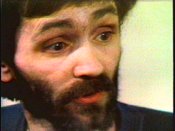 |  |  |  |  |
 | ||||
Stan Remembers: Interview with the madman, Charles Manson
Reporter: Stan Atkinson Photographers: KOVR 13 News, KTVU News The Tate-La Bianca murders in the late 1960's put an end to the illusion that drugs were just harmless fun. Hopped up on drugs and pumped full of confidence by their leader, Charles Manson's "family" brutally murdered eight people, including actress Sharon Tate and her unborn baby. Stan Atkinson covered the trial from beginning to end. Of course, there were no interviews allowed then. But in 1975, while working for KTVU in Oakland, Stan hoped that Manson might remember his presence in that courtroom for all those months. Some 300 other people had also requested interviews. They wrote the warden. Atkinson wrote Manson directly, and it worked. Stan Atkinson: The interview I arranged with Manson was the first for television news. When I went into that room in San Quentin prison in 1975, his appearance had changed drastically.
The long-flowing hair was gone. He seemed to have aged 20 years. But the eyes were the same. Steely, and on the rare occasion that he actually looked at me directly, extremely intense. He was working on trying to get permission to be his own attorney. Stan Atkinson / 1975: "What's your life like in prison, Charlie? What do you do, what's your routine kind of day?" Charles Manson / Convicted Murderer: "I spent two, two, three years in a cell doing nothing, just thinking about it. Just thinking it out and thinking about all the different areas of thought, and why they thought that particular areas and spectrums of awarenesses..." Stan Atkinson / 1975: "Doesn't that make you bitter?" Charles Manson / Convicted Murderer: "Political. Bitter? Yes, I could get bitter and get mad. That's one thing the cell teaches you. If you get angry at somebody you're only getting angry at yourself. If you get angry at somebody you're only getting angry at yourself. If you fight against something that really isn't even there, you're only fighting against yourself. This again, when I said you're fighting against your own reflection."
Reflecting thoughts was a Manson trademark. Even in the hour I spent with him, it was clear he was trying to manipulate me, to get me to hear what he thought I wanted to hear. Stan Atkinson / 1975: "You wrote something that you distributed to the press, or the girls did, after you were convicted. You said, 'I am what you have made of me, and the mad-dog devil killer fiend leper is a reflection of your society.' what'd you mean by that Charlie? Were you saying that, in fact, you are a mad-dog devil killer?" Charles Manson / Convicted Murderer: "No, no. Here's what I... That's the word reflection. If you and I are in a room together and I don't disagree with anything you say, then who do you have to disagree with?" Stan Atkinson / 1975: "Okay, but why didn't you disagree? Why didn't you say, 'hey, I'm not guilty?'"
Charles Manson / Convicted Murderer: "I tried that. And I wasn't allowed to disagree. I was allowed to sit down and be quiet. That's what public opinion called for: sit down, be quiet, and we'll do this." In 1975, Manson seemed under no illusion that he would ever be freed. He said he missed the sun, walking on grass and playing his music, but had no desire to be with other people. Then again, when Charlie went into Manson-speak, it was always hard to figure out what he really was saying. Charles Manson / Convicted Murderer: "They'd come up again and say, 'can we be with you?' and I would simply say, 'can you be with yourself?' and they would say, 'yeah.' and I say, 'then if you're with yourself, you're automatically with me. If you can be with you, I've always been there.'" In a way, Manson did escape. When the Supreme Court struck down the death penalty, his sentence was commuted to life in prison. Now, in his late 60's, he remains incarcerated in Corcoran State prison. Back to top of the page Back to the Stan Atkinson page |
News Scripts News Team Question of the Day Sites & Links
Stan Remembers: Saddam out of control, Kuwait in flames Stan Remembers: Father Hoa and his little army Stan Remembers: On the road with LBJ Stan Remembers: Way news is covered has changed since the Donner Ridge forest fire Stan Remembers: 1977 Cuba a mixture of heaven and hell Stan Remembers: Vietnam and BT Collins, fates intertwined Stan Remembers: Dangerous days covering El Salvador Stan Remembers: The tragedy in Cambodia Stan Remembers: Sometimes covering the news risks your safety
6 am Daybreak News at Noon News at 5:00 News at 6:00 THE 10:00 News Saturday 5:00 Saturday 11:00 Sunday 6:30 Sunday 11:00 |
 | ||||



